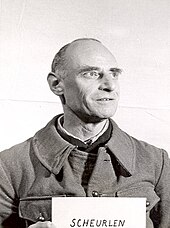Heinz Scheurlen
Heinz Scheurlen (often wrongly spelled Scheuerlen) (born April 24, 1895 in Stuttgart ; † April 27, 1971 ibid) was a German officer , most recently a lieutenant general . He became known as the German military commander in Greece during the closing stages of World War II .
Live and act
After graduating from high school, Scheurlen joined the Imperial Navy . In April / May 1913 he attended the Naval School Mürwik where he acquired the rank of ensign at sea . After visiting the he received from May 1913 to March 1914 training as a midshipman on the heavy cruiser SMS Victoria Luise . He then completed an officer course at the naval school until July 1914.
After the outbreak of World War I , Scheurlen was a platoon leader in the XV from August 1, 1914 to September 16, 1914 . Naval battalion. From September 17 to December 12, 1914, he completed training with the Naval Air Corps in Johannisthal . He was then successively a pilot at the naval aviation stations in Warnemünde (December 13, 1914 to January 25, 1915), Holtenau (January 26, 1915 to July 31, 1915), Warnemünde (August 1, 1915 to September 18, 1915) and Libau ( September 19, 1915 to May 5, 1916). This was followed by a longer period of use as a pilot in the torpedo squadron in Holtenau and Angernsee (May 6, 1916 to December 1, 1916). He then went through a month-long course on the ship of the SMS Württemberg torpedo school in Flensburg - Mürwik . From January 7, 1917 to February 1, 1918, he was a pilot in a torpedo squadron, possibly in Flensburg- Fahrensodde or in Zeebrugge , or in both of these places. Then, from February 2 to March 27, 1918, he completed a longer navigation course at the Mürwik Naval School. From March 28, 1918 to October 2, 1918 he then held the post of leader of a torpedo squadron in Zeebrugge, before serving as a pilot with the 1st Sea Flight Battalion from October 2 to 21, 1918. Shortly before the end of the war he became director of the Aabenraa flight school, which he remained until June 30, 1919.
After Scheurlen was employed at the Flensburg Sea Airplane Station from July 1 to September 25, 1919 and then at the Holtenau Sea Airplane Station until November 22, 1919, he was accepted into the police force on November 22, 1919: He was initially until 1920 employed by the air police in Kiel and then worked for the police in Stettin until he left on March 31, 1923 . From April 1, 1923 to November 1925, he was technical director at the Junkers factories, for which he worked in Persia and Russia , among others . He then worked from November 1925 to February 28, 1927 as a flight instructor at Lufthansa in Boeblingen . From March 1927 to September 30, 1934 Scheurlen was director of a flight school in List on Sylt .
Scheurlen was reactivated as an officer in April 1934 as part of the massive expansion of the German Air Force, which the National Socialists had been pursuing since 1933: He was initially employed as an advisor in the Air Force District Command VI in Kiel from October 1, 1934 to July 31, 1935. He then switched as an advisor in the command office and later in the technical department of the Reich Aviation Ministry , where he remained active until September 30, 1936.
In the period from October 1, 1936 to March 31, 1940, Scheurlen was finally commander of the air force school and base commander in Bug on Rügen . From April 17, 1940 to December 19, 1941, he was employed as a flight training commander.
From December 20, 1941 to October 31, 1942, Scheurlen served as Chief of Staff for training matters in the Air Force Ministry. He was then from November 3, 1942 to February 14, 1943 commander of the flight training command 3. Then he was from February 15 to November 20, 1943 flight training commander of a pilot school. From January 1 to April 25, 1944 Scheurlen was the commander of the air fleet control command.
In the late phase of World War II, Scheurlen was appointed German field commander in Athens and military commander in Greece with effect from April 26, 1944 , which he remained until October 25, 1944. He was then until December 10, 1944 Wehrmacht commander in Macedonia . From December 11, 1944 to April 30, 1945, Scheurlen was still a member of the so-called Führerreserve in the Air Force High Command , where he was made available to the replacement flight division.
After Scheurlen retired on April 30, 1945, just before the end of the war, he became a prisoner of war on May 8, 1945 , from which he was finally released on June 16, 1947. During his imprisonment, he took part in the Nuremberg trials as a witness .
| personal data | |
|---|---|
| SURNAME | Scheurlen, Heinz |
| BRIEF DESCRIPTION | German officer, most recently lieutenant general in World War II |
| DATE OF BIRTH | April 24, 1895 |
| PLACE OF BIRTH | Stuttgart |
| DATE OF DEATH | April 27, 1971 |
| Place of death | Stuttgart |
